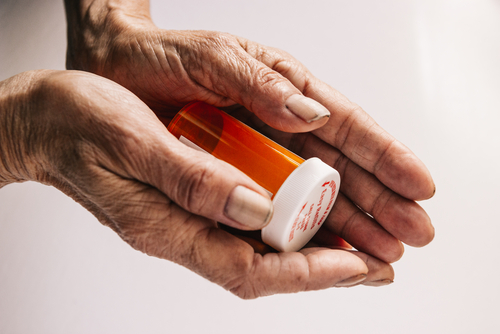Medical Cannabis Versus Opioids
Posted 7 years ago by Ian Shutts

Chronic pain is one of the most disabling and debilitating medical conditions. It prevents you from enjoying life, affects your relationships with others, impacts your financial future, and worsens your general wellbeing.
While most pain, be it acute or chronic, can be controlled by over-the-counter and prescription pain medications, some types of pain though like neuropathic and cancer pain need stronger drugs to effectively control it. One such prescription drug is opioid-based painkillers.
Benefits of Opioid-Based Painkillers
Opioids are the most common drug prescribed to patients suffering from chronic and intractable pain. Some of these include oxycodone, hydrocodone, and codeine.
They work by binding to the opioid receptors found in the different parts of the body, particularly the brain and spinal cord. When opioids activate these receptors, not only do they decrease your pain, but they also increase your tolerance to pain by changing the way you perceive it.
The Dangers of Opioid-Based Painkillers
Opioids may be very effective in controlling pain, but they are a very dangerous drug. For one, they do have side effects like constipation, nausea, dizziness, fatigue, confusion, dry mouth, slurred speech, and hallucinations. They also have an effect on your respiration and lead to breathing problems.
Another problem with opioids is that they can be very addictive and potentially toxic to the body. In fact, there is an opioid addiction crisis right now with more than two million Americans dependent or addicted to these prescription painkillers.
As for deaths caused by opioid drug overdose, the rate is increasing. In 2002, an estimated number of more than 10,000 people died from opioid drugs, and in 2015, the numbers increased to almost 35,000. If experts are correct, these numbers will worsen this 2017.
Medical Cannabis for Chronic Pain
Cannabis, like opioids, also has potent analgesic effects. THC, in particular, works by activating the CB1 receptor, a function of which includes pain modulation and regulation. CBD, on the other hand, exerts its analgesic effects by activating other receptors responsible for pain control like the TRPV1 and serotonin receptors. In addition to this, CBD also boosts the anandamide levels circulating in the body by preventing their breakdown. Anandamide is our endogenous cannabinoid and binds to the CB1 receptors to produce analgesic effects.
Furthermore, cannabis is also known for its anti-inflammatory effects, and chronic pain, as studies have shown, is worsened by the presence of chronic inflammation. With cannabis controlling inflammation, pain is reduced.
Comparing Cannabis and Opioids
While both can control pain, the advantages of using cannabis far outweigh the advantages of using opioids.
Cannabis has little to no effects on breathing like opioids do because there are no cannabinoid receptors in the region of the brain responsible for breathing. Opioids, on the other hand, can affect breathing because there are plenty of opioid receptors in the brain’s respiratory control center. High doses of opioids can not only cause breathing problems but result in respiratory arrest as well.
Thousands of people have lost their lives because of opioid overdose, but this is not the case with cannabis. In fact, there are no recorded cases of cannabis overdose resulting in death.
Opioids have adverse side effects. Long-term use even leads to opioid dependence and addiction. This is not the case with cannabis though. While THC can cause a “high” and can also lead to dependence, CBD, on the other hand, does not produce these effects. CBD can be used to treat chronic pain without fear of becoming dependent on it or fear of its side effects since CBD has a very good safety profile. High-dose CBD and low-dose THC can also be used together to control chronic and intractable pain. They can boost each other’s analgesic effects, with CBD controlling THC’s unwanted side effects.
Stopping opioid-based drugs causes withdrawal side effects, but cannabis can not only control the withdrawal symptoms associated with opioid cessation but can even prevent the development of opioid tolerance. If you’re worried about cannabis dependence, again, CBD has been shown to control alcohol, nicotine, and drug addiction, including cannabis itself.
Cannabis or Opioids for Chronic Pain?
Because of medical cannabis’s safety profile, particularly CBD, and its effectiveness in controlling chronic and intractable pain, more and more patients are switching to medical cannabis and reducing their opioid use.
In fact, in medical cannabis states, there has already been a reduction in the number of opioid painkiller overdose and deaths, according to a study published by The JAMA Internal Medicine. A different study also revealed that there has already been a drop in conventional painkiller prescriptions (including opioids) in medical cannabis states, decreasing their opioid use by as much as 64%.
Medical cannabis, compared to opioids, is just as effective in treating chronic pain, but its relatively good safety profile and effects in controlling opioid addiction and withdrawal symptoms make medical cannabis an excellent alternative therapy for chronic pain or at least an add-on medication.